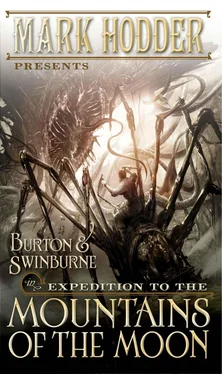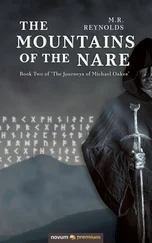Mark Hodder - Expedition to the Mountains of the Moon
Здесь есть возможность читать онлайн «Mark Hodder - Expedition to the Mountains of the Moon» весь текст электронной книги совершенно бесплатно (целиком полную версию без сокращений). В некоторых случаях можно слушать аудио, скачать через торрент в формате fb2 и присутствует краткое содержание. Жанр: sf_stimpank, на английском языке. Описание произведения, (предисловие) а так же отзывы посетителей доступны на портале библиотеки ЛибКат.
- Название:Expedition to the Mountains of the Moon
- Автор:
- Жанр:
- Год:неизвестен
- ISBN:нет данных
- Рейтинг книги:5 / 5. Голосов: 1
-
Избранное:Добавить в избранное
- Отзывы:
-
Ваша оценка:
- 100
- 1
- 2
- 3
- 4
- 5
Expedition to the Mountains of the Moon: краткое содержание, описание и аннотация
Предлагаем к чтению аннотацию, описание, краткое содержание или предисловие (зависит от того, что написал сам автор книги «Expedition to the Mountains of the Moon»). Если вы не нашли необходимую информацию о книге — напишите в комментариях, мы постараемся отыскать её.
Expedition to the Mountains of the Moon — читать онлайн бесплатно полную книгу (весь текст) целиком
Ниже представлен текст книги, разбитый по страницам. Система сохранения места последней прочитанной страницы, позволяет с удобством читать онлайн бесплатно книгу «Expedition to the Mountains of the Moon», без необходимости каждый раз заново искать на чём Вы остановились. Поставьте закладку, и сможете в любой момент перейти на страницу, на которой закончили чтение.
Интервал:
Закладка:
“Humph! I suppose.”
“And where was nature better symbolised in your age than in Africa? No wonder this continent fell victim to his paranoia!”
Burton shook his head despairingly. “I don't know how you can endure it.”
“Somehow, I still have hope,” Wells answered, “or I could not live.”
Burton took a gulp from the canteen. He coughed and spluttered as brandy burned its way down his throat.
“I was expecting water!” he croaked.
Wells watched two dragonflies flitting back and forth over the flowers. “It's ironic,” he said softly.
“What is?”
“That I'm fighting the Germans.”
“Really?”
“Yes, for in some respects, since he seized power, Nietzsche has expanded upon the beliefs I held as a younger man, and I feel strongly drawn to his philosophy.” Wells looked at Burton. “You were right, by the way: Nietzsche did seize power in 1914 and Rasputin did die. According to our Intelligence agents, he suffered a brain haemorrhage. It happened in St. Petersburg, so your claim that you were responsible doesn't hold up-unless, that is, you possess extraordinary mediumistic powers, in which case I should deliver you to Colonel Crowley at the soonest possible moment.”
Burton shook his head. “I have no such abilities, Bertie. So what is Nietzsche's philosophy?”
Wells sighed and was silent for a moment. Then he said: “He proposes an entirely new strain of human being. One that transcends the bestial urges.”
A memory squirmed uncomfortably at the back of Burton's mind. He reached out, picked a flower from the mound, and held it in front of his face, examining its petals. They did nothing to aid his powers of recollection.
“The Greek Hyperanthropos?” he asked.
“Similar. The term he uses is Ubermensch. A man free from the artificial limitations of moral codes.” Wells snorted contemptuously. “Moral codes! Ha! As much as we invoke God with our exclamations and curses, we all know that he's dead. Your Darwin killed him outright, and the concept of supernaturally defined morals should have died with the deity!”
Burton held up an objecting hand and blew out a breath. “Please!” he exclaimed. “He was never my Darwin!”
“He was a man of your time. Anyway, without a God to impose ideas of right and wrong, mankind is left with a moral vacuum to fill. Nietzsche's Ubermensch populates it according to an inner inclination that is entirely divorced from social, cultural, or religious influences. What blossoms within him is therefore utterly authentic. Such an individual will, according to Nietzsche, transcend his animal instincts. Furthermore, from amid all these singular standards of behaviour, certain common values will emerge, and they will be so completely in tune with the zeitgeist that human evolution will accelerate. God left a vacancy. We shall fill it.”
Burton considered this for a moment, then said, “If I understand you correctly, the implication is that the zeitgeist, time itself, has some sort of beneficial purpose.”
“Yes. Nietzsche posits that, through living as we do, we have impeded our proper relationship with time. We misunderstand it. We see only one aspect of it and we allow that to dominate us. It keeps us bound to the natural world. Only by becoming an Ubermensch can an individual grow beyond it.”
The sky suddenly grew darker. The sun was beginning to set.
Wells said, “You don't happen to be an Ubermensch , I suppose? You have, after all, somehow managed to defy the normal limitations of time.”
Burton gave a wry smile. “I very much doubt that I'm anything Nietzsche might aspire to.”
He reached among the flowers and brushed idly at a flat moss-covered stone. “Beresford. That's who I've been trying to remember. Henry-um-Henry de La Poer Beresford. Yes! The Mad Marquess! Bismillah! Bertie! This Ubermensch business is remarkably similar to something the creator of the Libertine and Rake movements came up with. He was obsessed with the idea of what he termed the trans-natural man , and he was inspired in that by-by-bloody hell!”
“What is it?” Wells asked, puzzled.
“By Spring Heeled Jack!”
“By folklore?”
“By Edward Oxford!”
“Are you referring to the man who assassinated Queen Victoria?”
“Yes-and no.”
“You're not making any sense, Richard!”
“I'm-I'm trying to remember!”
Burton scrubbed furiously at the stone, as if cleaning it of moss might also clear his foggy memory.
“The Libertines,” Wells said. “I believe they opposed the Technologists for a period but pretty much died out during the 1870s or 80s.”
Burton didn't answer. He was leaning forward and frowning. Wells looked at him curiously then moved to his side. He reached out, pushed flowers out of the way, and, in the dwindling light, peered at the flat stone.
“Are those letters on it?” he asked.
“Yes,” Burton murmured. “There's some sort of inscription.”
Wells reached into his pocket and pulled out a dagger. “Here, use this.”
Burton took it and used the blade to scrape the moss away. Words were revealed. They read:
Thomas Manfred Honesty
1816–1863
Lost His Life While
Liberating the Enslaved.
R.I.P.
On the morning the expedition departed Nzasa, having stayed there for a single night, Sir Richard Francis Burton sent Pox to Isabel to report his position. When the parakeet returned, it squawked: “Message from Isabel Arundell. We are still harassing the stinky-mouthed enemy. I have so far lost eighteen of my women to them. They are preparing a moronic party to follow you. We will try to hold them back. Grubby pants. Message ends.”
With the threat of pursuit, Burton tried to establish a greater sense of urgency among his porters, but already his safari was assailed by problems. Upon packing to leave the village, it was discovered that two boxes of equipment were missing and three of the Wasawahili had deserted; one of the mules appeared to be dying; and water had found its way into three sacks of flour, rendering them unusable.
The explorer, who from previous experience had resigned himself to such misfortunes, put a bullet through the mule's head, discarded the flour, redistributed the loads, and got his people moving.
The second day saw them trek from Nzasa to Tumba Ihere. The route led over gently undulating grasslands and through miry valleys, past a bone-strewn burial ground where witches and other practitioners of uchawi -black magic-had been burned at the stake, and across a fast-flowing stream where they lost another mule after it slipped and broke a leg.
They rested for an hour.
Swinburne abandoned his stretcher.
“I'm fine and dandy! In the pink! Fit as a fiddle!” he announced. “How far to the next village?”
“At least four hours' march,” Burton replied. “You can't possibly be in full bloom. You had half your blood sucked out a couple of days ago.”
“Pah! I'm perfectly all right. Confound it! I was hoping the village would be closer.”
“Why?”
“Because I want to try that pombe African beer you once told me about!”
They started moving again, crossing a plain that seethed with wildlife, and for half an hour, Swinburne, who was now riding a mule while holding an umbrella over his head, amused himself by shouting the names of every species he spotted: “Zebra! Koodoo! Giraffe! Guinea-fowl! Lion! Quail! Four-legged thingummy!”
He then fell off his mount, having fainted.
They put him back onto the stretcher.
After wrestling their way through a long stretch of sticky red soil and onto firmer, hilly ground, they were met by men from the village of Kiranga-Ranga. These Wazamaro warriors each bore three long puckered scars extending across both cheeks from their earlobes to the corners of their mouths. Their hair was plastered down with ochre-coloured mud and twisted into a double row of knobs that circled their heads. They wore loincloths of unbleached cotton and had strings of beads looped around their necks, which were also fitted with tightly beaded bands, known as mgoweko collars. A solid ring of brass circled their wrists. They carried muskets, spears, bows with poisoned arrows, and long knives.
Читать дальшеИнтервал:
Закладка:
Похожие книги на «Expedition to the Mountains of the Moon»
Представляем Вашему вниманию похожие книги на «Expedition to the Mountains of the Moon» списком для выбора. Мы отобрали схожую по названию и смыслу литературу в надежде предоставить читателям больше вариантов отыскать новые, интересные, ещё непрочитанные произведения.
Обсуждение, отзывы о книге «Expedition to the Mountains of the Moon» и просто собственные мнения читателей. Оставьте ваши комментарии, напишите, что Вы думаете о произведении, его смысле или главных героях. Укажите что конкретно понравилось, а что нет, и почему Вы так считаете.












